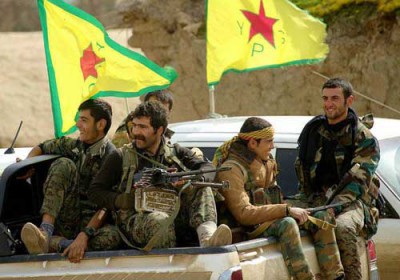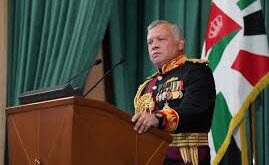Syria’s Kurds appear to be in the process of making a mistake of monumental proportions.
Central government offices in the north-eastern provincial capital of al-Hasaka are reported to have been evacuated after being overrun by Kurdish forces – specifically, units of the Asayish militia affiliated to the People’s Protection Force (YPG), the military arm of the Democratic Union Party (PYD) which is in turn the Syrian branch of Turkey’s Kurdistan Workers Party (PKK). Fighters are said to have raised Kurdish flags over government buildings and prevented civil servants from entering them, and a number of premises were looted or torched. If these reports are accurate, as seems to be the case, the Kurds are effectively scrapping a five-year-old alliance that has served them well, and plunging into a suicidal confrontation with both Arabs and Turks.
Syria’s Kurds, mostly descended from refugees from what is now Turkey, have in large part secured their rights as Syrian citizens. Their key grievances and demands were addressed by the regime soon after the outbreak of the 2011 uprising, notably when it naturalize done quarter of a million of them at a stroke. They have much to lose by issuing a call-to-arms against the central authority and putting an end to its nominal presence in Hasaka. The move guarantees them the hostility not just of Damascus but of the majority of Syrians, be they pro- or anti-regime.
The Asayish may enjoy American backing, including some 300 ground troops and military advisors and formidable cover from the US air force. But real protection for the Kurds can only be achieved via coexistence and good neighbourly relations with other population groups. That entails, among other things, adhering to the Russian-brokered agreement that was negotiated between the PYD and Damascus at Hmayyim airbase near Latakia. This stipulated that the Kurds should respect official Syrian government premises in Hasaka and the city’s Arab and Syrian character.
Turkey, the Kurds’ fiercest enemy, will lose no time trying to exploit the growing animosity between Kurds and Arabs — which in turn is being fuelled by the US in much the same way that it fanned the flames of sectarianism in Iraq and throughout the region with its occupation of Baghdad. Deputy Premier Numan Kurtulmuş maintains that the aim of the current Turkish military operation against the Syrian border town of Jarablus – so-called Operation Euphrates Shield — is to rid the area of Islamic State (IS) forces and prevent the partitioning of Syria by stopping the YPG from creating a corridor to the Kurdish enclave in the northwest of the country. But combating IS is little more than a pretext, convenient cover for what is essentially an anti-Kurdish offensive.
The Americans, on whose support the Kurds are relying, will for their part have no qualms about abandoning them once they have outlived their usefulness – as the British and French did after promising them independence in the Treaty of Sevres in the 1920s, and as the US did after backing Mullah Mustafa Barzani’s Kurdish revolt in Iraq in the 1970s. If the Americans have to choose between the Kurds and the combined forces of Iran, Iraq, Syria and Turkey, they are unlikely to opt to throw their lot in with the former, or to wage a regional or world war on their behalf.
After five years of war in Syria and the failure of any side to resolve it in its favour militarily, it makes sense for the exhausted combatants to seek political solutions that spare further blood-letting. But as a consequence of regional and international intervention, the opposite could be happening. The rapid shifting of alliances in the conflict may well prolong it further.
Turkey’s direct intervention in Syria opens a new front against the Kurds west of the Euphrates and signals the third time since the conflict began that Ankara has changed its main priority. Initially, its principal goal was to topple the regime in Damascus. Then it became to uproot IS. Now it is to thwart the Kurds’ ambition to establish a land corridor between the Kurdish heartlands and the Mediterranean.
Accordingly, a campaign of anti-Kurdish incitement is underway – largely employing Turkish-sponsored Syrian Arab opposition groups – with the YPG being accused of ethnically cleansing Arabs from territory under its control, trying to seize areas where Kurds constitute only a small proportion of the population, and settling Kurds on formerly Arab-inhabited lands
One upshot of this could be a trade-off between Ankara and Damascus. There has been growing talk of a deal-in-the-making between the two sides, supported by Iran and Iraq and to a lesser extent by Russia. This would supposedly provide for Aleppo to revert to full Syrian government control in exchange for giving Euphrates Shield a free hand against the Syrian Kurds. This quid-pro-quo is said to have have been worked out at meetings in Baghdad, Tehran and Ankara between top-level Syrian and Turkish intelligence chiefs.
The conflict in Syria has been depicted by some as essentially a sectarian Sunni-Shia struggle, or as one between between Islamists and secularists. Now it is increasingly assuming an ethnic-national dimension: Arab-Kurdish, Turkish-Kurdish and Persian-Kurdish. It is on this basis that the current redrawing of alliances is likely to take place if things continue proceeding to plan.
Nothing comes as a surprise any longer in the Syrian conflict. In parallel to the apparently evolving partnership between former arch-enemies in Ankara and Damascus, we could soon see ‘moderate’ Turkish-sponsored Syrian opposition factions make common cause with the Syrian regime alongside the groups taking part in Euphrates Shield. A process of differentiating between the ‘moderate’ and the ‘extremist’ or ‘terrorist’ opposition is in full swing, and could produce some intriguing results.
The big winner out of all of this would seem to be the Syrian government. Former foes have begun to seek its friendship and to forge alliances with it. For Turkey, intervening militarily in Syria is an adventure replete with risks. As for the Arab states thats take all on the regime’s overthrow – and committed billions of dollars, thousands of tons of weapons, and hundreds of thousands of hours of TV airtime to that cause — they have been side-lined, and they are fearful and worried in the extreme.
Writes: Abdel Bari Atwan
 Geostrategic Media Political Commentary, Analysis, Security, Defense
Geostrategic Media Political Commentary, Analysis, Security, Defense





